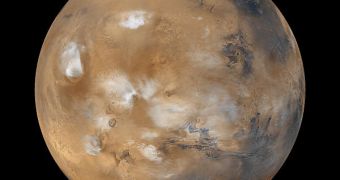At a recent workshop organized by the American Astronautical Society and Explore Mars Inc., a group of 60 industry, academic, and government experts met up to discuss the main challenges facing the exploration and colonization of Mars. The group concluded that reaching the Red Planet by the mid-2030s is feasible, provided that some major policy chances are enacted.
Workshop participants – representing a total of 30 institutions and organizations – agreed that it is entirely possible for NASA to afford manned missions to Mars in the next 15 to 20 years, provided that its fundings are restored to pre-sequestration levels as soon as possible.
However, putting the first astronauts on the Red Planet is not simply a matter of funding NASA. Experts agreed that the private industry needs to be contacted and integrated into any such project.
At the same time, this effort may simply be too much for any one country, so international cooperation such as that seen in the construction of the International Space Station may be necessary.
The international space exploration community already agrees that a mission to Mars should be the main goal for this field over the next two or three decades, said the executive director of Explore Mars In., Chris Carberry, quoted by Space News.
“To be able to make it feasible and affordable, you need a sustainable budget. You need a budget that is consistent, that you can predict from year to year and that doesn’t get canceled in the next administration,” the space policy expert added.
Specialists present at the workshop also agreed that pre-sequestration NASA funding levels are sufficient to develop a manned orbital mission to Mars, but not one that would see astronauts safely landing on the surface of our neighboring world, and then returning home to Earth.
NASA “funds are divided between various missions, directorates and centers. Unless there was a MAJOR restructuring, it would be hard to accomplish a NASA-led Mars mission. That said, major disruptive technology gains could always occur that could make it viable – we just can’t count on that happening,” Carberry argued in a recent email.
For the current fiscal year, US President Barack Obama proposed a NASA budget of $17.7 billion (€13.1 billion), which is roughly $59 million (€43.5 million) less than what the space agency got in 2012.

 14 DAY TRIAL //
14 DAY TRIAL //